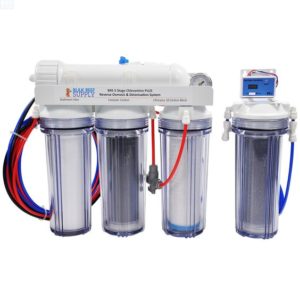As water evaporates in your saltwater aquarium, the salinity levels will increase if the water is not replaced on a regular basis. However, water can come from a variety of sources and understanding which options are best for your tank can prevent certain issues like algae growth or harm to your fish and corals. Generally these choices include reverse osmosis, distilled and tap water.
Can I Use Tap Water to Top Off My Tank?
Do not use tap water to top off your tank. This water often contains traces of chlorine, chloramine, fluoride, copper, and varying phosphate levels which can stimulate algae growth. This can also can negatively affect the health of living organisms within your tank.
What Water Should Be Use In A Saltwater Aquarium?
The most common water sources for water changes and top-offs is reverse osmosis (RO) and distilled. Most hobbyists would agree that reverse osmosis is the better option between the two but typically, either will work. The below outlines the key differences:
RO Water:
With reverse osmosis, you can typically achieve close to 0 TDS (Total Dissolved Solids); especially if a Reverse Osmosis (RO) & De-ionization (DI) unit is used. Salt mix should now be added to RO water as most are designed to replace essential elements lost. The purification process removes calcium and magnesium. Aquarists can do from home by installing a RO unit of their own making it a more convenient solution.
Tip: If you have installed a reverse osmosis system, consider running an automatic top off to your tank using a float valve. Much like the way the tank on your toilet or evaporative cooler works. This will save you time and offer more stable water parameters for your aquarium.
Distilled Water:
Like reverse osmosis, the distillation of water also removes most trace elements and purifies the water to a high degree. However, some minerals require a lower boiling point than water so distilled water may contain more TDS than RO. Distilled water may have traces of copper due to the heated copper rings used during distillation. This may or may not be true and really depends on the water distiller. Like many aquarists, I have used distilled water when RO water wan’t available and did not notice a negative impact on my reef.
At the end of the day, reverse osmosis remains the safest option for your saltwater aquarium. However, if you must use distilled water, a copper test kit can help you determine a good distiller.
related: My first saltwater aquarium – checklist for success



















